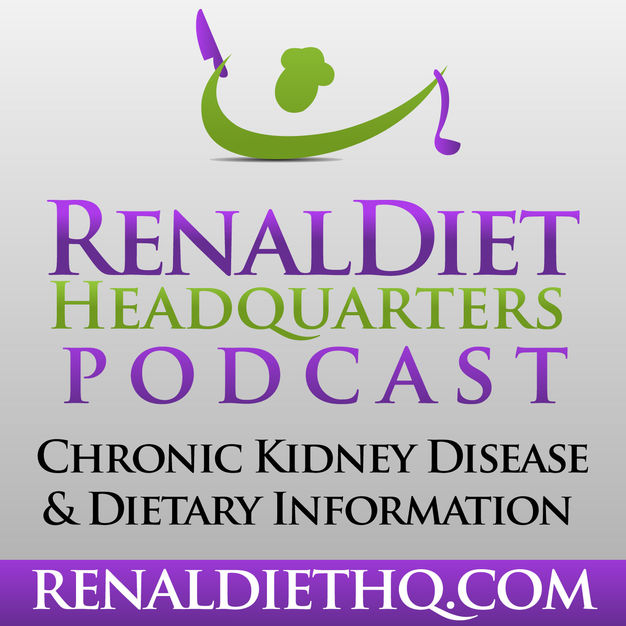
Podcast | Renal Diet Menu Headquarters
Podcast | Renal Diet Menu Headquarters
In this podcast, we talk about all the facets of kidney failure and chronic kidney disease. From pre-dialysis to transplant, we cover all the things that people need to know to understand the disease and be proactive in their care. We provide actionable information on a weekly basis from leaders in the industry to keep you on top of the latest news.
- 12 minutes 18 secondsOatmeal for Kidney Health: A Complete Guide for CKD Patients -Podcast

In the realm of managing kidney health, finding nutritious yet kidney-friendly foods can be a journey. But fear not, because one humble grain might just be the answer to your dietary concerns. Oats, often celebrated for their heart-healthy properties, also offer a plethora of benefits for individuals grappling with kidney disease. Today, we delve into the world of oats and their potential to revolutionize your renal diet. Join me, Mattia Ford, a registered dietitian nutritionist specializing in chronic kidney disease, as we unlock the secrets of incorporating oats into your daily regimen, ensuring a healthier, more vibrant life.
For More Recipes and Ideas --->> Get Your Free Meals and Recipes That Are Perfect for Pre-Dialysis Diets, Pre-Dialysis with Diabetes, or Dialysis Diets.
Understanding Oats and Kidney Health
Oats, the stalwart of breakfast tables worldwide, emerge as a nutritional powerhouse particularly suited for individuals wrestling with kidney disease. Packed with soluble fiber, notably Beta glucan, oats shine in their ability to lower LDL cholesterol, bolster heart health, and ease constipation. For those navigating chronic kidney disease (CKD), the choice of oats becomes paramount. Opting for minimally processed varieties like steel-cut oats over highly processed options such as instant oats is crucial. The latter may harbor elevated levels of potassium, phosphorus, or sodium, potentially detrimental for CKD patients. Before incorporating oats into your diet, a careful perusal of nutritional labels becomes essential, ensuring alignment with dietary restrictions associated with CKD. Remember, consulting with a healthcare professional prior to making significant dietary alterations is sage advice, safeguarding against unintended consequences.
Exploring Varieties of Oats
Delving into the world of oats unveils a cornucopia of options catering to diverse tastes and culinary needs. From hearty whole oats to convenient instant oats, each variety brings its unique texture and nutritional profile to the table. Rolled oats, known for their swift cooking time and smooth consistency, stand in stark contrast to the chewier, longer-cooking steel-cut oats. Whole oats, untouched by extensive processing, boast a rich nutrient content ideal for enhancing renal-friendly menus. Whether you opt for the nutty flavor of steel-cut oats or the convenience of instant oats, the choice is yours. With oats, versatility knows no bounds.
Benefits of Oats for Kidney Patients
The benefits of incorporating oats into a renal diet are manifold. Their low sodium and phosphorus levels make them an attractive option for individuals with kidney disease, alleviating the burden on compromised kidneys. Furthermore, the high fiber content in oats supports bowel regularity, a boon for those grappling with gastrointestinal issues. Not to be overlooked is the role of oats in promoting heart health and stabilizing blood sugar levels, crucial considerations for kidney patients navigating comorbidities such as diabetes. However, prudent portion control remains paramount, ensuring that the nutritional benefits of oats are harnessed without compromising kidney health.
Potential Drawbacks and Precautions
While oats present a nutritious option for renal patients, a note of caution is warranted. Moderation is key, especially considering the moderate potassium and phosphorus content in oats. Consuming large quantities or pairing oats with other high-potassium foods may inadvertently elevate potassium intake, posing risks of hyperkalemia. Similarly, individuals with advanced CKD stages must vigilantly monitor their phosphorus intake to avert complications. Strategies such as soaking oats overnight can help mitigate phosphorus absorption, fostering a safer approach to incorporating oats into the renal diet. By collaborating with a registered dietitian and adhering to tailored meal plans, kidney patients can reap the benefits of oats while safeguarding their kidney health.
Oats emerge as a formidable ally in the quest for optimal kidney health. With their myriad benefits spanning heart health, digestion, and blood sugar management, oats offer a tantalizing prospect for renal patients seeking to enhance their dietary repertoire. By exercising prudence in portion control and seeking guidance from healthcare professionals, individuals can embark on a journey towards improved kidney health with oats as their faithful companion. Embrace the possibilities, and let oats pave the way to a healthier, more vibrant life.
The post Oatmeal for Kidney Health: A Complete Guide for CKD Patients -Podcast appeared first on Renal Diet HQ.
Suggested Reading:
10 May 2024, 1:19 pm - 2 minutes 33 secondsMyth vs Fact: CKD Symptoms are Always Obvious - Podcast
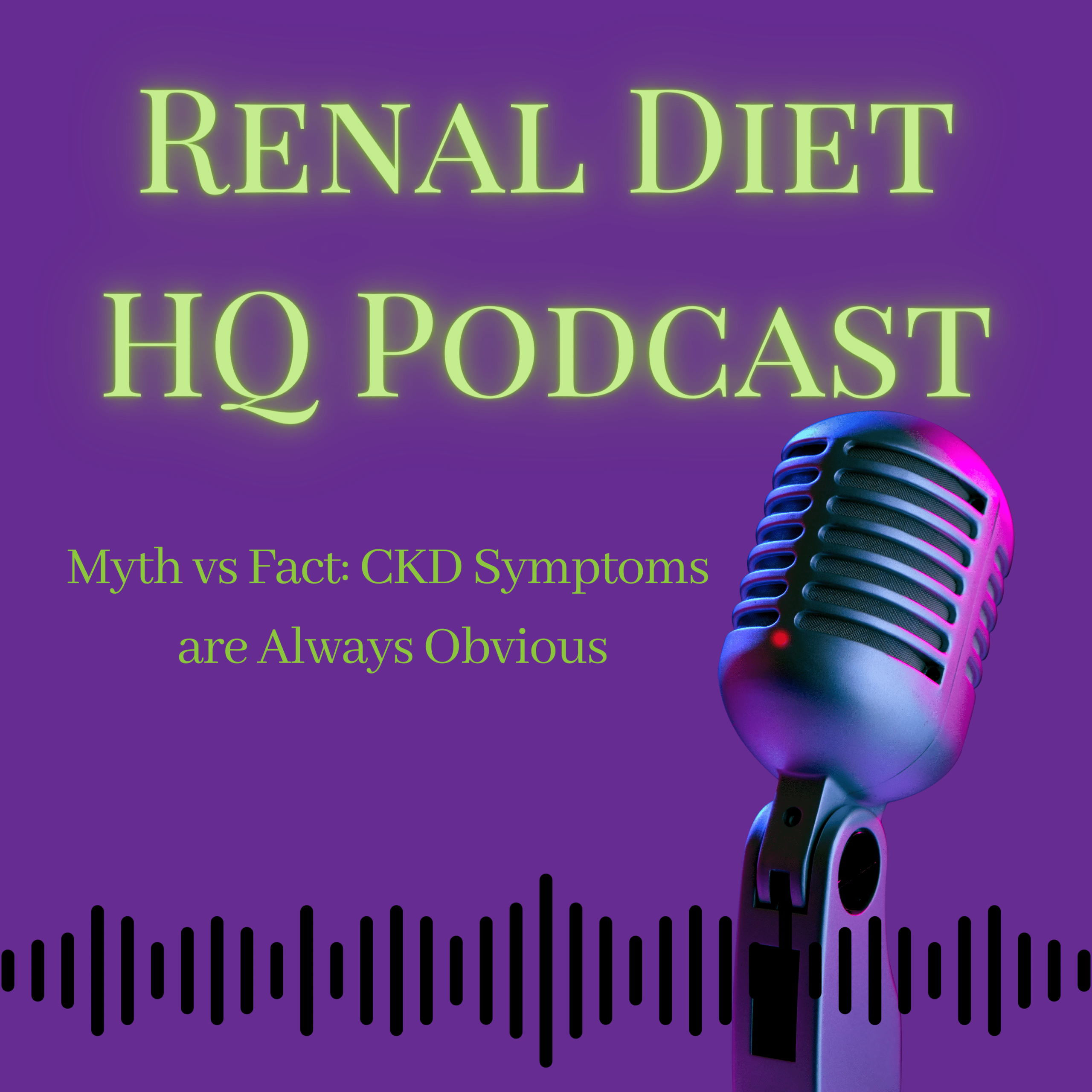
Hi, everyone! Today, we're going to tackle a common myth about chronic kidney disease or CKD. The belief that if you have CKD, you'll definitely know it because of clear symptoms. Let's unpack this, shall we?
For More Recipes and Ideas --->> Get Your Free Meals and Recipes That Are Perfect for Pre-Dialysis Diets, Pre-Dialysis with Diabetes, or Dialysis Diets.
Understanding Chronic Kidney Disease (CKD)
CKD is a bit of a sneaky condition. It's often thought that it announces itself with symptoms like kidney pain. But here's the reality: In its early stages, CKD can be quite silent. That's right, CKD often doesn't show its symptoms initially. This is why it's sometimes called a silent disease. The kidneys can be quietly losing their function without sending out any loud signals or pain.The Silent Nature of CKD
CKD is known for its silent progression. Even though it's a serious condition, it can develop without causing noticeable symptoms. This is why regular testing is crucial, especially for those at risk. Tests like blood tests, urine tests, and blood pressure checks can help detect CKD early on when it's most manageable.Importance of Early Detection
Why is early detection important? Because the sooner you know, the sooner you can take steps to manage it and protect your kidney health. Slowing down the progression of CKD is key, and early intervention is the best way to achieve this. This may involve lifestyle changes, dietary adjustments, and possibly medication. Don't wait for symptoms to take your health seriously—regular checkups are key, especially if you have risk factors like diabetes, hypertension, or a family history of kidney disease.Taking Action
It's time to take action to protect your kidney health. Regular checkups and proactive monitoring can make all the difference in catching CKD early and managing it effectively. Remember, prevention is better than cure. By staying informed and proactive, you can keep your kidneys healthy and happy for years to come.Debunking the myth about CKD and its symptoms is essential for raising awareness and promoting early detection. By understanding the silent nature of CKD and the importance of regular testing, individuals can take proactive steps to protect their kidney health. Together, let's erase awareness and support each other in managing CKD. If you found this information helpful, feel free to share it, and don't hesitate to drop a comment below if you have any questions or experiences related to CKD. Here's to keeping our kidneys healthy and happy!
The post Myth vs Fact: CKD Symptoms are Always Obvious - Podcast appeared first on Renal Diet HQ.
Suggested Reading:
8 May 2024, 12:56 pm - 16 minutes 55 secondsIs Tuna Good For Kidney Disease? -Podcast
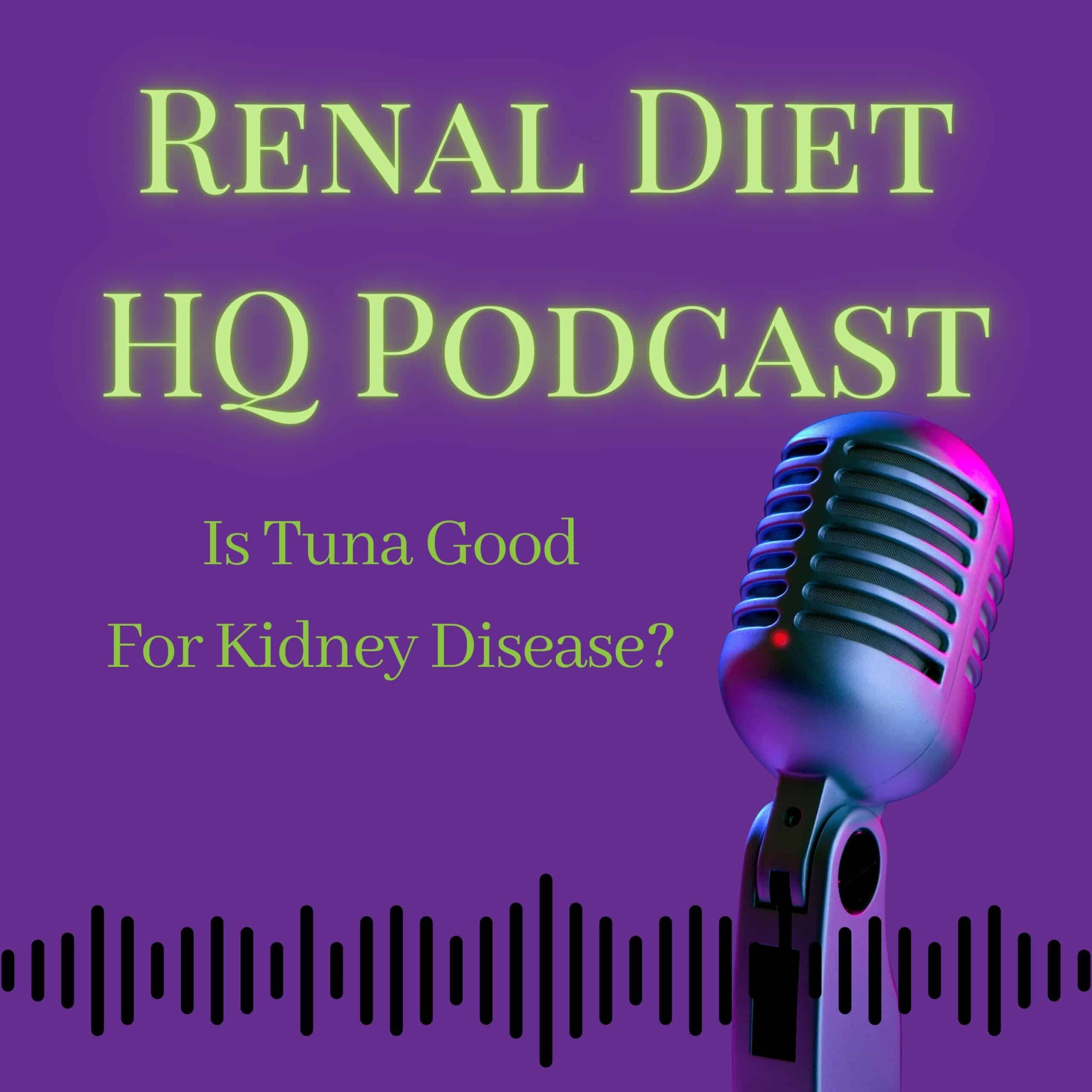
Do you have a friend or family member diagnosed with kidney disease? Are you wondering about the best foods for them to eat? In this guide, we'll delve into the health benefits and potential risks associated with consuming tuna for individuals with kidney damage.
For More Recipes and Ideas --->> Get Your Free Meals and Recipes That Are Perfect for Pre-Dialysis Diets, Pre-Dialysis with Diabetes, or Dialysis Diets.
Understanding Tuna's Nutritional Value
Tuna is a versatile fish, rich in essential nutrients like omega-3 fatty acids, protein, vitamins, and minerals. These components play crucial roles in maintaining overall health, especially for those managing kidney disease.
Sodium Concerns and Tuna Consumption
Sodium content varies in different types of tuna, which can pose risks for individuals with kidney issues. It's essential to be mindful of sodium levels and opt for low-sodium tuna options when possible. Reading nutrition labels carefully can help in making informed choices.
Nutritional Profile of Tuna
Tuna packs a punch in terms of macronutrients, offering a good balance of protein, fats, and minimal carbohydrates. Its potassium content is notable, making it suitable for individuals with kidney disease. However, careful consideration is needed to avoid excess potassium intake.
Incorporating Tuna into a Kidney-Friendly Diet
Planning meals that include tuna can be beneficial for individuals managing kidney health. Safe cooking methods, such as steaming or poaching, help minimize health risks. Additionally, choosing tuna varieties with lower mercury levels and avoiding excessive sodium intake are crucial considerations.
Exploring Health Benefits and Risks
Tuna's omega-3 fatty acids offer various health benefits, including reducing inflammation and improving heart health. However, concerns about mercury levels and sodium content warrant attention. It's essential to weigh the potential risks against the benefits and consume tuna in moderation.
Tuna can be a valuable addition to a kidney-friendly diet, offering essential nutrients like protein and omega-3 fatty acids. However, it's crucial to be mindful of sodium and mercury levels, opting for low-sodium and responsibly sourced tuna options. Consulting healthcare professionals for personalized dietary recommendations is always advisable. By incorporating tuna responsibly and in moderation, individuals managing kidney health can enjoy its nutritional benefits while minimizing potential risks.
The post Is Tuna Good For Kidney Disease? -Podcast appeared first on Renal Diet HQ.
Suggested Reading:
3 May 2024, 10:00 pm - 2 minutes 25 secondsMyth vs Fact: CKD is Always Caused by Diabetes-Podcast
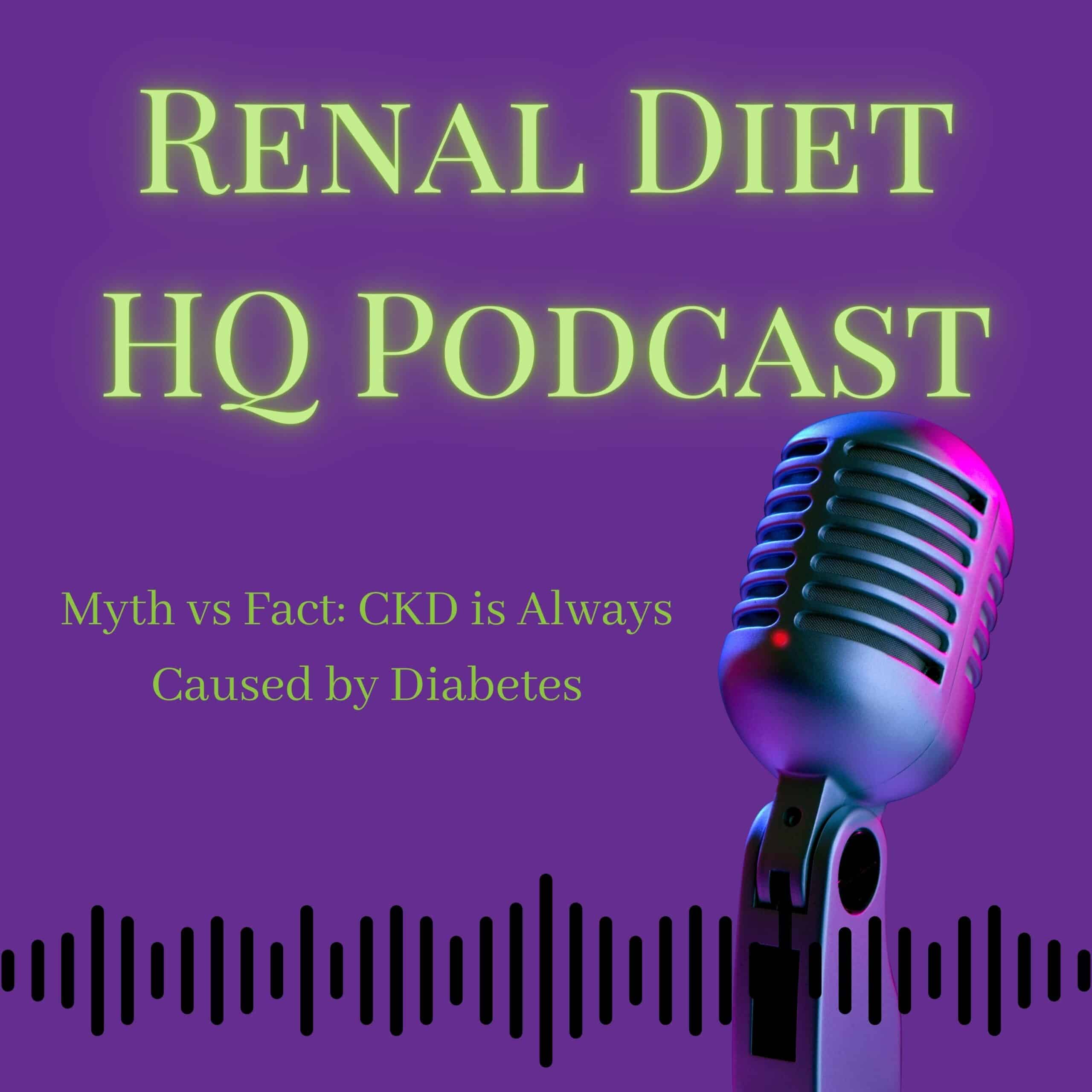
Chronic kidney disease (CKD) is a serious health condition that affects millions of people worldwide. Despite its prevalence, there are several misconceptions surrounding CKD, with one of the most common being the belief that diabetes is the sole cause. In this article, we'll delve into this widespread myth and explore the various factors contributing to CKD, shedding light on the importance of understanding its multifaceted nature.
For More Recipes and Ideas --->> Get Your Free Meals and Recipes That Are Perfect for Pre-Dialysis Diets, Pre-Dialysis with Diabetes, or Dialysis Diets.
Dispelling the Myth
The notion that diabetes is the leading cause of CKD is deeply ingrained in popular belief. While it's true that diabetes can significantly contribute to CKD, it's essential to recognize that it's not the only culprit. CKD stems from a variety of factors, and diabetes is just one piece of the puzzle.
Other Culprits of CKD
One major factor besides diabetes is hypertension, commonly known as high blood pressure. Much like putting too much pressure on a hose can lead to damage over time, hypertension can exert strain on the kidneys, eventually causing CKD. This analogy illustrates the gradual deterioration of kidney function due to prolonged high blood pressure.
Additional Causes
Beyond diabetes and hypertension, CKD can arise from various other sources. Certain infections can compromise kidney health, while inherited disorders like Polycystic Kidney Disease (PKD) pose significant risks. Additionally, prolonged use of certain medications, such as ibuprofen, can also impact kidney function over time.
Implications for Maintaining Health
Understanding the multifaceted nature of CKD underscores the importance of maintaining overall health. Whether you have diabetes, high blood pressure, or any related conditions, prioritizing your well-being is crucial in preventing CKD. Regular checkups, effective management of blood pressure, and awareness of family health history are vital steps in safeguarding kidney health.
Debunking the myth that diabetes is the sole cause of CKD is essential in raising awareness about this complex condition. By recognizing the various factors contributing to CKD, we can empower individuals to take proactive steps in preserving kidney function. Let's spread the word and encourage early detection and prevention efforts to combat CKD effectively.
Take charge of your health by scheduling regular checkups and staying informed about CKD risk factors. If you have any questions or experiences related to CKD, feel free to share them in the comments below. Together, let's prioritize kidney health and work towards a healthier future.
The post Myth vs Fact: CKD is Always Caused by Diabetes-Podcast appeared first on Renal Diet HQ.
Suggested Reading:
1 May 2024, 3:17 pm - 15 minutes 23 secondsLife-Changing Diet Tips for Hemodialysis Patients: Eat Right, Feel Amazing! -Podcast

Living with advanced kidney disease presents unique challenges, especially when it comes to managing your diet. If you or a loved one is undergoing hemodialysis treatment, understanding the intricacies of a hemodialysis diet is crucial for maintaining overall health and well-being. Hi, I'm Mathea Ford, a registered dietitian nutritionist specializing in chronic kidney disease. At Renal Diet HQ, I'm dedicated to helping individuals like you make delicious yet simple changes to your meals, ensuring a healthier and more vibrant life. Join me on this journey towards better health!
For More Recipes and Ideas --->> Get Your Free Meals and Recipes That Are Perfect for Pre-Dialysis Diets, Pre-Dialysis with Diabetes, or Dialysis Diets.
Understanding Hemodialysis
Hemodialysis serves as a lifeline for individuals with late-stage kidney disease, where the kidneys can no longer effectively filter waste products and excess fluids from the blood. During hemodialysis sessions, blood is circulated outside the body through a machine called a dialyzer, mimicking the kidney's essential function of filtering out waste and toxins. Regular hemodialysis sessions are vital for maintaining fluid and electrolyte balance, controlling blood pressure, and preventing the buildup of harmful substances.
Dietary Considerations in Hemodialysis
Patients undergoing hemodialysis must adhere to strict dietary restrictions to ensure the effectiveness of treatment and overall well-being. A hemodialysis diet plays a critical role in managing kidney failure and supporting the treatment's effectiveness. It involves careful regulation of fluid intake, sodium control, potassium management, phosphorus restriction, protein intake, calorie control, and micronutrient monitoring.
Components of a Hemodialysis Diet
Fluid intake must be closely monitored to prevent fluid retention, while excessive sodium consumption can lead to fluid retention and high blood pressure. Potassium-rich foods such as bananas and potatoes should be limited, as impaired kidney function may struggle to regulate potassium levels. High phosphorus levels can contribute to weak bones and heart problems, necessitating a reduction in phosphorus-rich foods like dairy products and nuts. While protein is essential, excessive consumption can lead to waste buildup, requiring balanced protein intake. Calorie control is crucial to prevent muscle loss and fatigue, while micronutrient monitoring ensures that essential vitamins and minerals are not lost during dialysis.
Recommended Foods for a Dialysis Diet
A dialysis diet comprises high-quality proteins, low potassium fruits and vegetables, low sodium foods, whole grains and starches, dairy alternatives, healthy fats, and appropriate fluids. Opt for lean protein sources like poultry and fish, low potassium fruits like apples and berries, and low sodium options to maintain overall health and well-being.
Foods to Avoid in a Dialysis Diet
Certain foods must be avoided in a hemodialysis diet due to their potential to exacerbate kidney issues. These include high potassium foods like bananas, high sodium options like processed foods, high phosphorus foods like dairy products, and high protein foods like red meats and processed meats. Additionally, fluid-heavy foods and certain dairy products should be limited or replaced with lower phosphorus alternatives.
Portion Control and Meal Planning Tips
Portion control is essential in managing nutrient intake and preventing overconsumption of substances that may strain the kidneys. Consulting a registered dietitian is crucial for developing personalized meal plans tailored to individual dietary needs and preferences. Emphasize a balanced plate approach, meal prepping, smart snacking, hydration planning, and staying informed about dietary recommendations and modifications.
Utilizing Meal Planning Resources
Various resources are available to support meal planning for individuals on a hemodialysis diet, including online tools, nutrition labels, kidney health magazines, and social media communities. These resources provide valuable information and recipes tailored to dietary restrictions and preferences, enhancing the overall meal planning experience.
Sample Meal Plan for a Hemodialysis Diet
A sample meal plan can provide guidance and inspiration for individuals navigating a hemodialysis diet. Consider incorporating options like scrambled egg whites with lean meats for breakfast, a salmon salad for lunch, low sodium crackers with cream cheese for a snack, and grilled chicken with vegetables for dinner. This balanced approach ensures optimal nutrient intake while adhering to dietary restrictions.
Managing a hemodialysis diet is essential for optimizing treatment outcomes and promoting overall health and well-being. By understanding the dietary considerations, recommended foods, and meal planning tips outlined in this guide, individuals undergoing hemodialysis can take control of their diet and live fulfilling lives. Remember to collaborate closely with your healthcare team and registered dietitian to develop personalized meal plans that meet your specific needs and preferences. With proper dietary management, you can navigate the challenges of kidney disease with confidence and resilience.
The post Life-Changing Diet Tips for Hemodialysis Patients: Eat Right, Feel Amazing! -Podcast appeared first on Renal Diet HQ.
Suggested Reading:
26 April 2024, 3:57 pm - 2 minutes 16 secondsMyth vs Fact CKD is a Death Sentence - Podcast
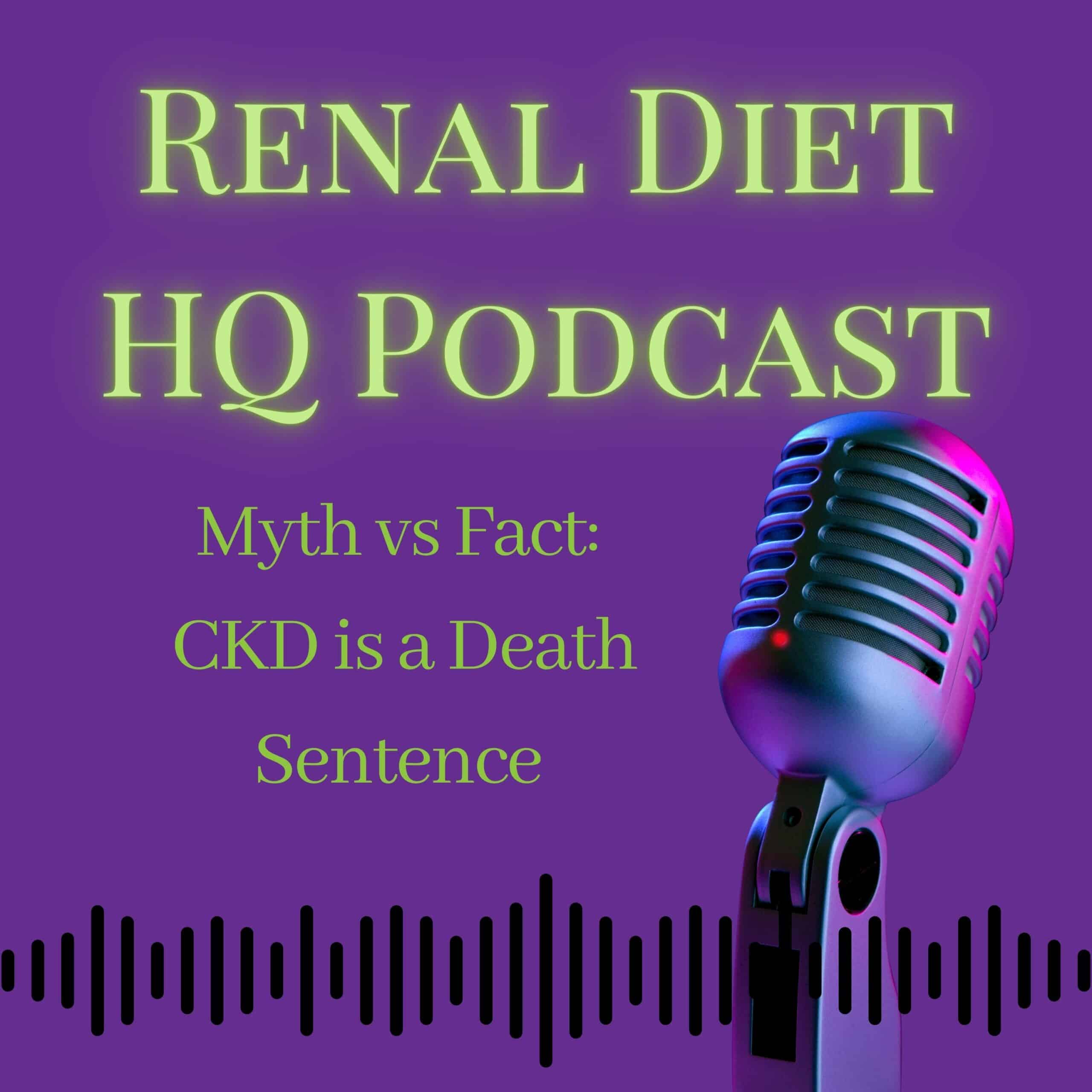
Greetings to all readers, today let's delve into a topic that often carries with it a heavy weight of misconception: Chronic Kidney Disease or CKD. It's common for people to view a CKD diagnosis as a death sentence, but let's take a closer look at the facts behind this belief.
For More Recipes and Ideas --->> Get Your Free Meals and Recipes That Are Perfect for Pre-Dialysis Diets, Pre-Dialysis with Diabetes, or Dialysis Diets.
The Reality of CKD
Chronic kidney disease (CKD) is a condition where the kidneys gradually lose their function over time. Understandably, receiving a CKD diagnosis can initially evoke fear and uncertainty. The prospect of managing such a condition may seem daunting, but it's important to confront these initial feelings with facts and understanding.
Debunking the Myth
One prevalent myth surrounding CKD is that it drastically shortens one's lifespan. However, it's essential to dispel this notion and recognize the reality that many individuals living with CKD lead long and fulfilling lives. How is this possible? Through diligent management and care.
Effective Management of CKD
Effectively managing CKD involves a multifaceted approach. Regular checkups with healthcare professionals are crucial to monitor the progression of the disease and make informed decisions about treatment. Additionally, maintaining a balanced diet and staying physically active can significantly impact the course of CKD. In some cases, doctors may prescribe specific medications to help manage both the condition and its symptoms.
Addressing the Mental Aspect
Beyond the physical aspects of CKD, it's vital to acknowledge the mental toll it can take. Receiving a CKD diagnosis can be overwhelming, but it's important to remember that support is readily available. Connecting with others who understand what you're going through can provide invaluable comfort and guidance during challenging times.
Embracing the Journey
Living with CKD is not just about managing the condition—it's about embracing it as a journey. Despite the hurdles and uncertainties, this journey can still be filled with moments of joy, achievements, and meaningful experiences. By adopting the right approach to CKD management, individuals can navigate this journey with resilience and optimism.
Spreading Awareness and Hope
It's essential to spread awareness and hope about living with CKD. By sharing this message, we can empower others facing similar challenges and create a supportive community. I encourage you to share your own stories and tips for living with CKD in the comments below. Together, we can provide encouragement and support to each other on this journey.
Chronic kidney disease is not a death sentence. By debunking the myth and embracing a proactive approach to management, individuals with CKD can lead fulfilling lives. Remember, you are not alone on this journey. Let's continue to support each other and spread awareness and hope for a brighter future.
The post Myth vs Fact CKD is a Death Sentence - Podcast appeared first on Renal Diet HQ.
Suggested Reading:
25 April 2024, 8:53 pm - 14 minutes 40 secondsThe Ultimate Guide: Best Fluids To Hydrate With Kidney Disease - Podcast

In the journey of managing chronic kidney disease, understanding the pivotal role of hydration becomes paramount. From safeguarding kidney health to enhancing overall well-being, proper hydration is a cornerstone. Join us as we delve into the intricate relationship between hydration and kidney function, unraveling essential insights and practical tips to empower you on your health journey.
For More Recipes and Ideas --->> Get Your Free Meals and Recipes That Are Perfect for Pre-Dialysis Diets, Pre-Dialysis with Diabetes, or Dialysis Diets.
Understanding Hydration and Kidney Health
Hydration isn't just about quenching thirst; it's a vital component in maintaining kidney health. Chronic kidney disease accentuates the importance of managing fluid intake, as impaired kidneys struggle to eliminate excess fluids. Thus, striking a balance with kidney-safe fluids becomes imperative to prevent complications such as kidney stones and urinary tract infections.Key Points About Hydration
Water constitutes a significant portion of our bodies, contributing to essential bodily functions beyond hydration alone. Insufficient water intake can lead to various negative effects, including dehydration symptoms like dark urine and fatigue. Understanding these signs and their impact on kidney function is crucial for maintaining optimal health.Choosing Kidney-Friendly Hydration Options
Navigating hydration with kidney disease requires careful consideration of both beverages and foods. Opting for kidney-friendly fluids like herbal teas and incorporating hydrating fruits and vegetables into your diet can help ensure adequate hydration without overtaxing your kidneys. By making mindful choices, you can support kidney health while enjoying a diverse range of hydrating options.Impact of Soda and Coffee on Kidney Health
Excessive soda consumption can pose risks to kidney health due to its high sugar and phosphorus content. Similarly, while coffee is not harmful in moderation, excessive intake may elevate potassium levels, potentially affecting kidney function. Exploring healthier alternatives like infused water and low-potassium fruit juices offers a safer approach to hydration for kidney patients.Managing Fluid Intake in Advanced Kidney Disease
In the later stages of kidney disease, fluid restriction becomes necessary to prevent complications like edema. Monitoring fluid intake through methods such as food diaries helps maintain optimal hydration levels while adhering to prescribed guidelines. By working closely with healthcare professionals, individuals can navigate fluid restrictions effectively, ensuring both kidney health and overall well-being.Hydrating Beverages and Foods for Kidney Health
Selecting hydrating options tailored to kidney health is essential for optimal well-being. From kidney-friendly beverages like herbal teas to hydrating fruits and vegetables such as watermelons and cucumbers, incorporating these choices into your diet supports both hydration and kidney function. By prioritizing hydration with suitable options, individuals can proactively manage their kidney health while enjoying a diverse and nourishing diet.Our exploration of hydration and kidney health, it's evident that proper fluid management is integral to overall well-being, particularly for individuals with chronic kidney disease. By understanding the nuances of hydration, making informed choices, and seeking guidance from healthcare professionals, you can navigate your health journey with confidence. Remember, prioritizing hydration isn't just about quenching thirst—it's about nurturing your kidneys and safeguarding your long-term health.
The post The Ultimate Guide: Best Fluids To Hydrate With Kidney Disease - Podcast appeared first on Renal Diet HQ.
Suggested Reading:
20 April 2024, 9:55 pm - 2 minutes 21 secondsMyth vs Fact: Only the Elderly get Ckd-Podcast
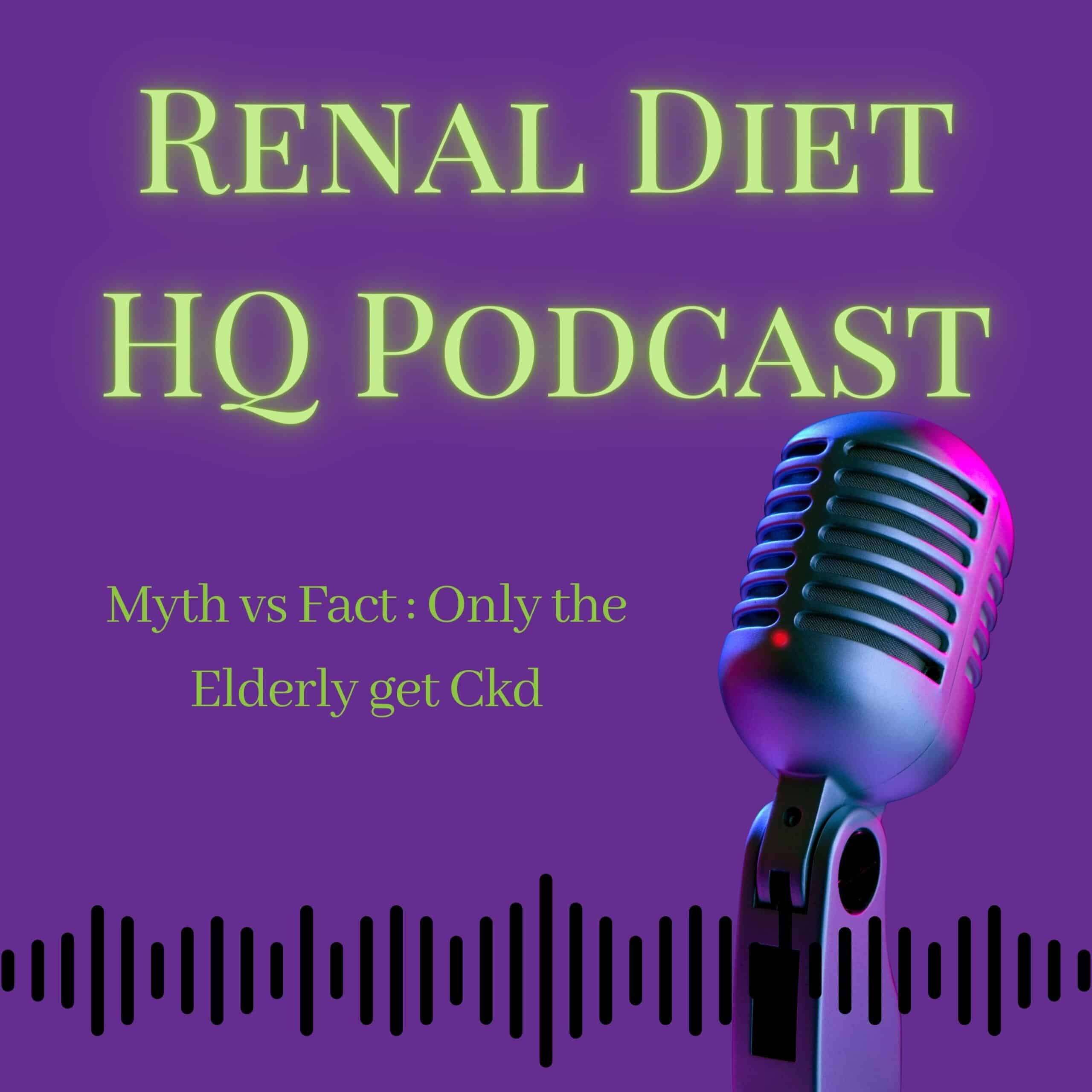
Hey there! Today, let's bust a common myth about chronic kidney disease or CKD. Many believe that CKD is a condition that only affects older adults but is that the complete picture? Let's find out.
For More Recipes and Ideas --->> Get Your Free Meals and Recipes That Are Perfect for Pre-Dialysis Diets, Pre-Dialysis with Diabetes, or Dialysis Diets.
Understanding CKD
CKD, where the kidneys gradually lose their function, is often associated with aging, and it's true that the risk increases as we get older. But here's the thing—CKD doesn't discriminate by age. In fact, CKD can affect individuals at any age.Causes of CKD
CKD can be caused by a variety of factors, including genetics, lifestyle choices, and other health conditions like hypertension or diabetes. Regardless of a person's age, hypertension and diabetes cause most cases of CKD.The Importance of Awareness
It's especially important to be aware of this because early detection and management of CKD can make a huge difference for younger individuals. This means paying attention to kidney health is as important as it is for older adults.Steps for Kidney Health
So, what can we all do? Regular checkups, maintaining a healthy lifestyle, and being aware of the symptoms of CKD are key steps to take control of our kidney health.Encouragement and Support
So let's spread this message to ensure everyone, young and old, takes kidney health seriously. And if you have any questions or thoughts, drop them in the comments below and let's keep the conversation going. Let's support each other in maintaining our kidney health. I'll talk to you soon.The post Myth vs Fact: Only the Elderly get Ckd-Podcast appeared first on Renal Diet HQ.
Suggested Reading:
17 April 2024, 7:47 pm - 18 minutes 41 secondsLiving Better with Kidney Disease: Vital Lifestyle Adjustments -Podcast
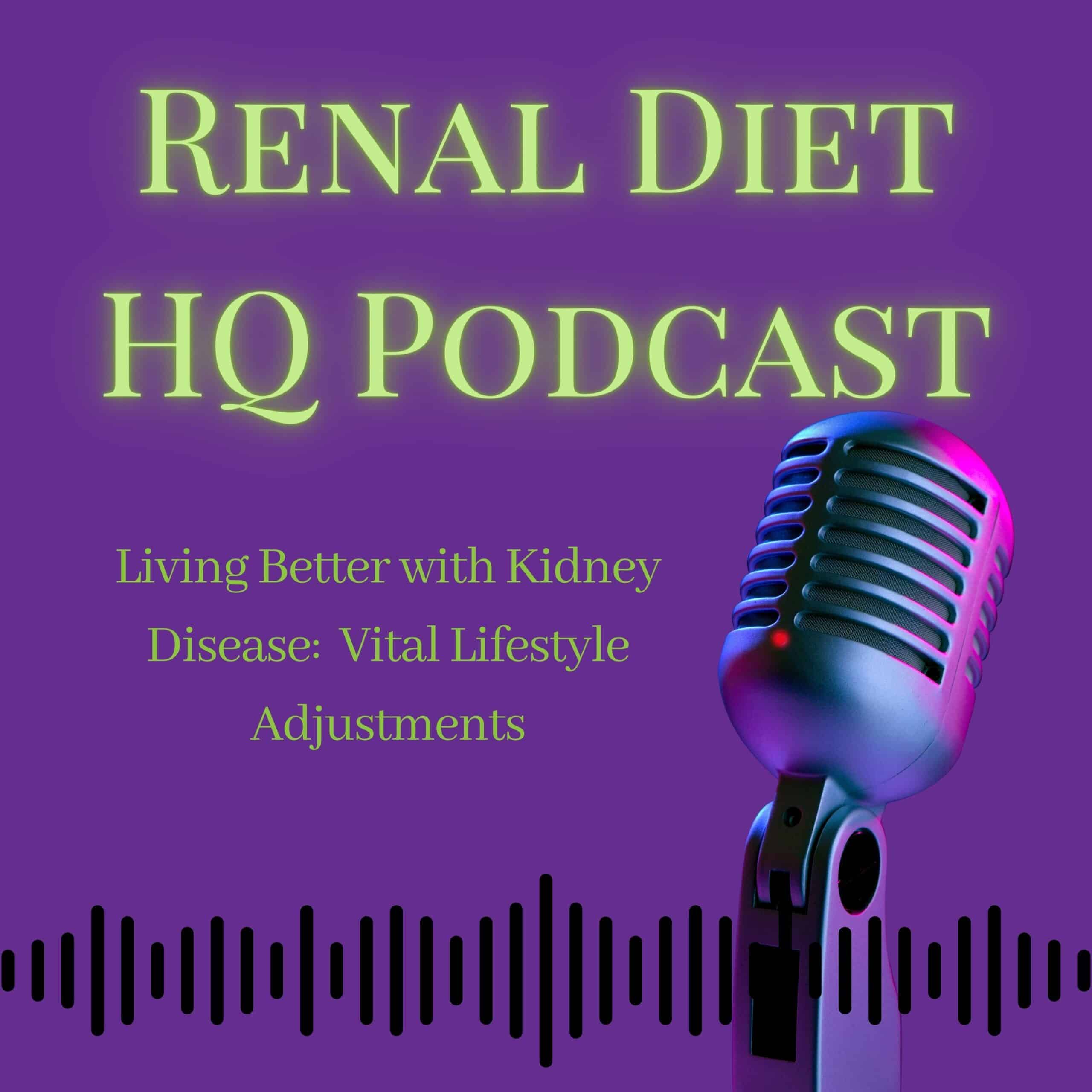
Chronic kidney disease (CKD) is more than just a diagnosis; it signifies a condition that necessitates significant lifestyle adjustments. Living comfortably while maintaining optimal kidney function requires adopting various lifestyle changes. While the prospect of altering one's lifestyle may seem daunting, the adjustments needed for managing CKD are akin to those for maintaining overall health through diet, exercise, and habit management. In this blog post, we will delve into the role of lifestyle changes in managing CKD and improving overall well-being.
For More Recipes and Ideas --->> Get Your Free Meals and Recipes That Are Perfect for Pre-Dialysis Diets, Pre-Dialysis with Diabetes, or Dialysis Diets.
Understanding the Role of Diet in CKD Management
The food you consume plays a crucial role in affecting kidney health. Adopting a kidney-friendly dietary regimen can significantly impact CKD progression and improve kidney function. This includes prioritizing foods such as fruits, vegetables, whole grains, and lean proteins while avoiding or limiting high-sodium, high-potassium, and high-phosphorus foods. It's important to work closely with a registered dietitian specializing in CKD to create personalized renal diets tailored to individual needs and preferences.Practical Tips for Dietary Management
Implementing dietary modifications is key to managing CKD effectively. Guidelines for CKD patients often include restricting protein intake, controlling sodium intake, and managing potassium and phosphorus levels. It's crucial to follow professional advice on food restrictions and stay vigilant about changes in body weight. Nutritional counseling plays a pivotal role in guiding patients through these dietary modifications, ensuring they receive the essential nutrients while minimizing kidney stress.Incorporating Physical Activity into Your Routine
Regular physical activity is beneficial for kidney health and overall well-being. Engaging in moderately intense exercise can help regulate blood pressure, control blood sugar levels, and improve mental health. Incorporating activities such as walking, cycling, or resistance training into daily routines can strengthen the heart muscle and positively impact kidney function. It's important to consult with a healthcare provider before starting any new exercise regimen and to gradually increase intensity over time.Quitting Smoking and Alcohol Moderation
Smoking and excessive alcohol consumption can exacerbate kidney damage and increase the risk of developing complications. Quitting smoking and moderating alcohol intake are crucial steps in managing CKD and preventing further kidney damage. Smoking raises blood pressure levels and interferes with the effectiveness of medications used to treat CKD, while excessive alcohol consumption strains the kidneys and can lead to dehydration and other health issues. By quitting smoking and moderating alcohol consumption, CKD patients can significantly improve their kidney health and overall well-being.Importance of Fluid Control and Medication Adherence
Fluid control is essential for managing CKD and preventing complications. CKD patients must monitor their fluid intake, be aware of hidden fluids in foods, and follow professional advice on fluid restrictions. Additionally, medication adherence is paramount in managing CKD effectively. Patients should understand their medications, organize them properly, and communicate any concerns or questions with their healthcare provider. By adhering to prescribed medication regimens and maintaining open communication with healthcare providers, CKD patients can optimize the effectiveness of their treatment.Managing Metabolic Conditions and Heart Health
CKD often coexists with other metabolic conditions such as diabetes and hypertension. Managing these conditions through lifestyle modifications is crucial for improving kidney health and reducing the risk of complications. Lifestyle changes, including dietary modifications, regular exercise, stress management, and medication adherence, play a vital role in managing metabolic conditions and maintaining optimal heart health. By adopting preventive strategies for heart disease and managing metabolic conditions effectively, CKD patients can enhance their overall health and well-being.Navigating chronic kidney disease requires implementing various lifestyle changes aimed at improving kidney health and overall well-being. By understanding the role of diet, incorporating physical activity, quitting smoking, moderating alcohol consumption, practicing fluid control, adhering to medications, and managing metabolic conditions and heart health, CKD patients can effectively manage their condition and lead healthier lives. It's essential for CKD patients to stay proactive in their management journey and work closely with healthcare providers to optimize their treatment and quality of life.
The post Living Better with Kidney Disease: Vital Lifestyle Adjustments -Podcast appeared first on Renal Diet HQ.
Suggested Reading:
12 April 2024, 4:33 pm - 21 minutes 1 secondFrom Symptoms to Diagnosis: Navigating Chronic Kidney Disease-Podcast
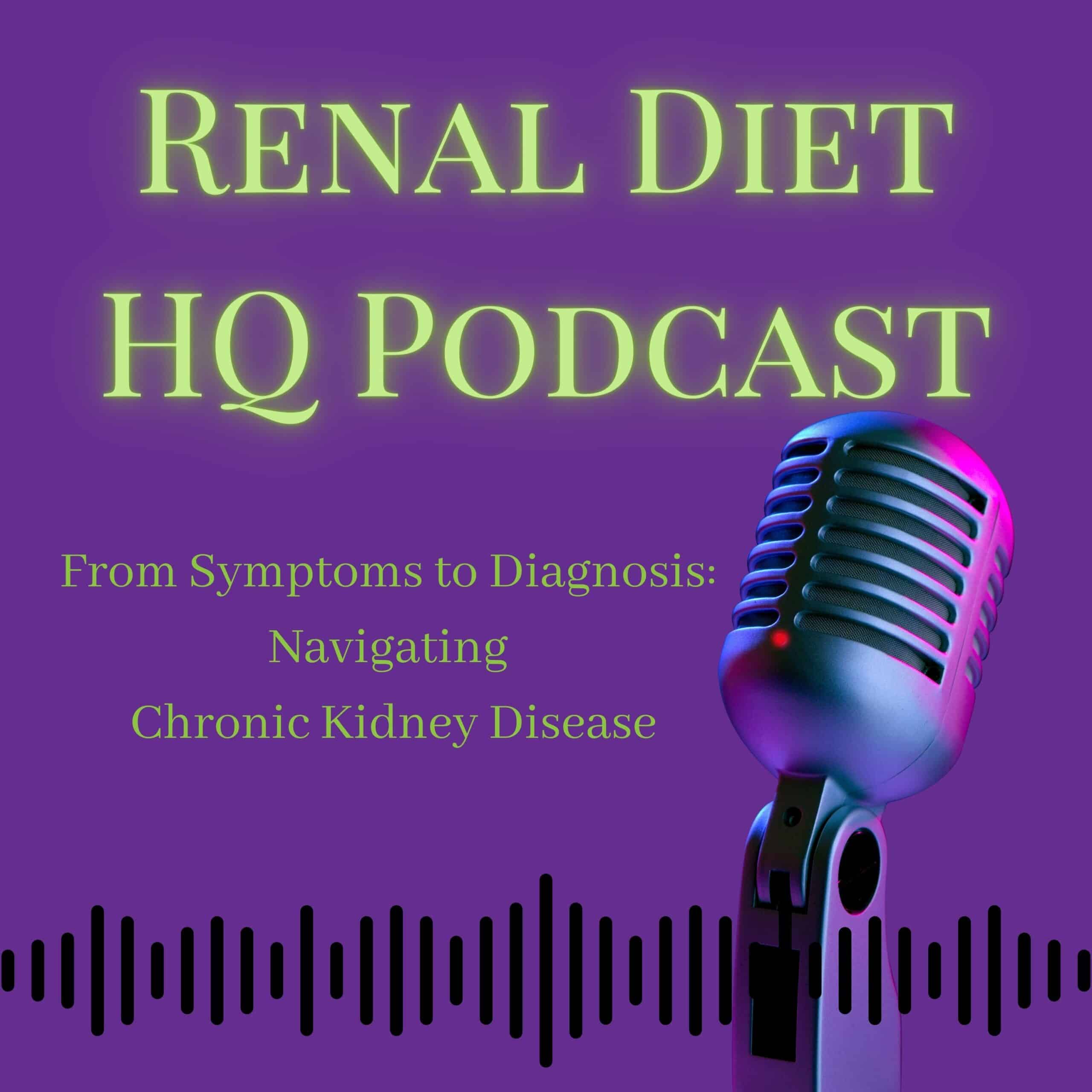
Chronic Kidney Disease (CKD) is a prevalent health condition affecting millions of people worldwide. Despite its common occurrence, many individuals may not be aware of the signs and symptoms until the disease has progressed significantly. In this comprehensive guide, we'll delve into the essential aspects of CKD diagnosis and management, shedding light on key tests, lifestyle factors, and treatment strategies. By understanding CKD better, individuals can take proactive steps towards better kidney health and overall well-being.
For More Recipes and Ideas --->> Get Your Free Meals and Recipes That Are Perfect for Pre-Dialysis Diets, Pre-Dialysis with Diabetes, or Dialysis Diets.
Key Tests for Diagnosing CKD
Diagnosing CKD involves a series of crucial tests aimed at evaluating kidney function and identifying any abnormalities. Among the primary tests used are measurements of albumin and creatinine levels, which provide valuable insights into kidney health. Additionally, ultrasounds and biopsies may be conducted for further examination, helping healthcare providers assess kidney structure and detect any underlying conditions. Early detection through these tests is essential for initiating timely interventions and slowing the progression of CKD.
Introducing the Expert: Registered Dietitian Nutritionist
As individuals navigate their CKD journey, the expertise of a registered dietitian nutritionist can be invaluable. Specializing in chronic kidney disease management, these professionals offer personalized guidance on dietary modifications to support kidney health. At RenalDietHQ, we empower individuals to make simple yet delicious changes to their meals, transforming their eating habits and enhancing overall well-being. Together, we embark on a journey towards a healthier, more vibrant life, one bite at a time.
Lifestyle Factors and Risk Reduction
Several lifestyle factors significantly impact renal health and contribute to the risk of developing CKD. Maintaining a healthy weight, engaging in regular physical activity, and understanding genetic predispositions are essential components of kidney disease prevention. By adopting proactive measures such as sharing family history with healthcare providers and making positive lifestyle changes, individuals can reduce their risk of CKD and promote optimal kidney function.
Role of Family Doctors in CKD Prevention and Diagnosis
Family doctors serve as primary care providers, playing a pivotal role in CKD prevention and diagnosis. Through regular checkups and monitoring of key health indicators such as blood pressure and kidney function, they facilitate early detection and intervention. Collaboration with trusted healthcare providers ensures timely identification of risk factors and implementation of preventive measures, contributing to improved kidney health outcomes.
Routine Testing for CKD
Routine testing forms the cornerstone of CKD management, enabling healthcare providers to monitor kidney function and detect any abnormalities early on. Urine and blood tests, coupled with ultrasound imaging, provide comprehensive insights into kidney health, guiding treatment decisions and interventions. By incorporating regular testing into healthcare routines, individuals can actively engage in their care and promote long-term kidney health.
Kidney Biopsies: Diagnostic Tool for CKD
In cases where further examination is warranted, kidney biopsies play a crucial role in diagnosing CKD. By extracting tiny tissue samples for microscopic examination, healthcare providers can accurately assess kidney function and identify underlying conditions. Kidney biopsies help tailor treatment plans to individual needs, ensuring effective management and improved outcomes for individuals with CKD.
Stages and Diagnosis of CKD
CKD diagnosis involves evaluating kidney function, damage, and duration to determine the appropriate stage of the disease. Through a comprehensive approach that includes physical examination, laboratory tests, and imaging studies, healthcare providers establish a definitive diagnosis and initiate targeted interventions. Early diagnosis enables proactive management, slowing disease progression and preserving kidney function.
Treatment Strategies for CKD Management
Managing CKD requires a multi-faceted approach that addresses underlying causes and complications. From diabetes and hypertension management to immune system regulation and infection treatment, customized treatment plans aim to slow disease progression and improve overall well-being. Collaboration among healthcare providers, including nephrologists, dietitians, and primary care physicians, ensures comprehensive care tailored to individual needs.
Complications and Management of CKD
CKD can give rise to various complications, ranging from cardiovascular issues to anemia and electrolyte imbalances. Effective management strategies, including lifestyle modifications, medication adjustments, and psychological support, are essential for minimizing the impact of these complications and enhancing quality of life. Through collaborative care and informed decision-making, individuals can navigate their CKD journey with confidence and resilience.
Understanding the complexities of CKD diagnosis and management is crucial for individuals seeking to optimize their kidney health. By embracing proactive measures, collaborating with healthcare providers, and staying informed about treatment options, individuals can take control of their CKD journey and work towards better outcomes. Together, we can empower individuals to lead healthier, fulfilling lives, free from the constraints of chronic kidney disease.
The post From Symptoms to Diagnosis: Navigating Chronic Kidney Disease-Podcast appeared first on Renal Diet HQ.
Suggested Reading:
5 April 2024, 4:57 pm - 14 minutes 4 secondsNavigating Daily Life with Chronic Kidney Disease: An Inside Look-Podcast

Living with kidney disease presents a unique set of challenges, impacting not just physical health but also emotional well-being. Receiving a chronic health diagnosis, such as kidney disease, is more than just learning the name of an illness; it's akin to being handed a life sentence. Suddenly, daily life is significantly altered, and the diagnosis can feel overwhelming. However, effective management of kidney disease is within reach, encompassing both physical and emotional aspects.
For More Recipes and Ideas --->> Get Your Free Meals and Recipes That Are Perfect for Pre-Dialysis Diets, Pre-Dialysis with Diabetes, or Dialysis Diets.
Understanding the Impact of Kidney Disease
Kidney disease isn't just about physical symptoms; it also affects mental health. Feelings of anxiety, depression, and stress can accompany the diagnosis, making it essential to manage these emotions effectively to ensure they don't hinder treatment progress. Recognizing the significance of kidney disease and its impact on daily life is the first step towards effective management.
Empowering Management Strategies
Taking control of kidney disease involves empowering yourself with knowledge and making necessary lifestyle changes. Seeking guidance from healthcare professionals, including registered dietitian nutritionists specializing in kidney disease, can help adapt to new routines and improve overall quality of life. Simple yet impactful dietary adjustments can play a crucial role in managing the condition.
Recognizing Symptoms and Seeking Support
Early detection of kidney disease is key to preventing progression and managing symptoms effectively. Regular checkups with healthcare providers are vital for monitoring kidney function and addressing any emerging issues. Additionally, seeking support from loved ones and joining support groups can provide invaluable emotional comfort and practical advice.Implementing Lifestyle Changes
Making lifestyle changes, including modifying diet and incorporating regular exercise, is essential for managing kidney disease. Understanding dietary restrictions and adhering to recommended meal plans can help alleviate strain on the kidneys and improve overall health. Every healthy choice counts towards managing the condition better and enhancing overall well-being.
Prioritizing Emotional Well-being
Maintaining mental health is just as crucial as physical health when living with kidney disease. Coping mechanisms such as mindfulness exercises and building a strong support network can help manage stress, anxiety, and depression associated with the diagnosis. Prioritizing emotional well-being enables individuals to navigate the challenges of kidney disease with resilience and positivity.
Maintaining Regular Health Monitoring
Regular medical tests and monitoring are essential for tracking kidney function and disease progression. Understanding lab values and interpreting test results in collaboration with healthcare providers is crucial for informed decision-making. By staying proactive in managing the condition and adhering to treatment plans, individuals can safeguard against further deterioration of kidney health.
Adhering to Treatment Plans
Medication adherence and following prescribed treatments, including dialysis or kidney transplant if necessary, are vital components of managing kidney disease. Lifestyle choices, such as maintaining a balanced diet and avoiding harmful habits, complement medical interventions and support overall disease prevention. Building a strong support system further enhances resilience during the treatment journey.
Finding Balance and Support
Finding balance in daily life while managing kidney disease is essential for maintaining quality of life. Support networks, including family, friends, and patient groups, offer emotional comfort and practical assistance. While kidney disease may present challenges, it doesn't define one's potential for joy and fulfillment. By navigating the journey with confidence and positivity, individuals can effectively manage their condition and prioritize their health.
Living with kidney disease requires a holistic approach that addresses both physical and emotional well-being. By understanding the impact of the condition, empowering oneself with knowledge, and implementing lifestyle changes, individuals can take control of their health and navigate the journey with resilience. Prioritizing emotional well-being, maintaining regular health monitoring, and adhering to treatment plans are crucial steps towards effectively managing kidney disease and improving overall quality of life.
As you embark on your journey of managing kidney disease, remember that you are not alone. Seek support from healthcare professionals, loved ones, and online communities to navigate the challenges with confidence. By prioritizing your health and well-being, you can embrace life's joys and challenges with resilience and optimism. Stay informed, stay proactive, and take control of your health journey.
The post Navigating Daily Life with Chronic Kidney Disease: An Inside Look-Podcast appeared first on Renal Diet HQ.
Suggested Reading:
29 March 2024, 2:36 pm - More Episodes? Get the App
Your feedback is valuable to us. Should you encounter any bugs, glitches, lack of functionality or other problems, please email us on [email protected] or join Moon.FM Telegram Group where you can talk directly to the dev team who are happy to answer any queries.
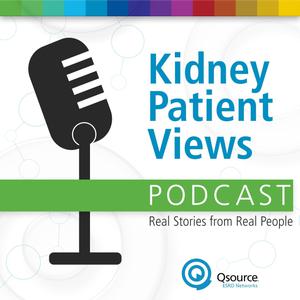 Kidney Patient Views
Kidney Patient Views
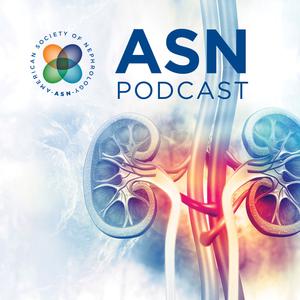 ASN Podcast
ASN Podcast
 KidneyTalk - An Online Radio Show By Renal Support Network
KidneyTalk - An Online Radio Show By Renal Support Network
 The Medical Minute from Renal & Urology News
The Medical Minute from Renal & Urology News
 Life as a Nephrologist Series
Life as a Nephrologist Series